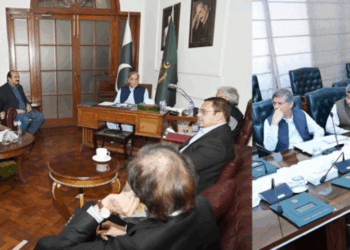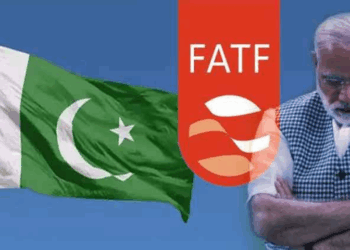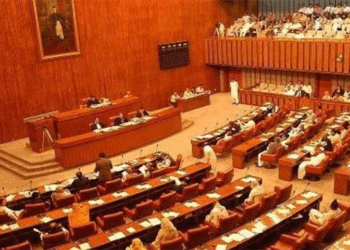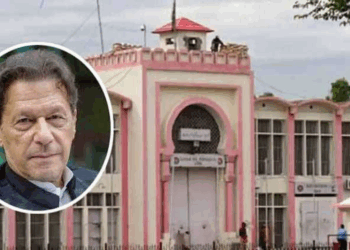Lahore, April 21, 2025: Jamiat Ulema-e-Islam-F (JUI-F) chief Maulana Fazlur Rehman and Jamaat-e-Islami (JI) Ameer Hafiz Naeem ur Rehman have jointly called for Muslim unity on the Palestine issue, announcing the formation of a new alliance titled “Majlis Ittehad-e-Ummat” aimed at uniting religious parties to defend sacred Islamic causes and foster collective action.
The announcement came after the two leaders met at JI’s headquarters in Mansoora, Lahore, marking their first formal engagement in over six years. The high-level meeting included senior leadership from both parties—JUI-F figures Rashid Mehmood Soomro, Maulana Amjad Khan, and Aslam Ghauri, as well as JI leaders Liaqat Baloch, Ameer-ul-Azeem, Dr. Farid Paracha, Maulana Javed Kasuri, and Ziauddin Ansari.
The discussions centered around the current political and regional crises, with a specific focus on the ongoing humanitarian crisis in Gaza. Both leaders emphasized the need for a unified and firm stance from the Muslim world on Palestine.
Speaking at a joint press conference, Maulana Fazlur Rehman expressed deep concern over the “genocide” in Gaza and criticized the Organisation of Islamic Cooperation (OIC) for what he described as a “toothless and disappointing” response.
“There must be a clear and collective voice from the Muslim Ummah on the Palestine issue,” he said, further condemning individuals traveling to Israel “via secret routes” and branding them as “fame-seekers”, unfit to represent Pakistan.
Fazl also addressed the concept of Jihad, calling it a sacred but strategic obligation. “Jihad is not like offering prayer—it demands wisdom and planning. Anyone who contributes to the cause of Palestine is participating in a form of jihad,” he remarked, dismissing critics of the term as “non-serious and clownish.”
On domestic issues, Fazlur Rehman voiced opposition to the Mines and Minerals Bill and expressed concern over provincial resource control, particularly in Sindh. He reiterated that “every province has the right to its own resources”, linking historical grievances such as the Kalabagh Dam dispute to the federal government’s failure to address provincial concerns.
Hafiz Naeem ur Rehman echoed similar views, affirming JI’s support for Palestine and backing calls for a coordinated political response to national challenges. Both parties confirmed their participation in a massive pro-Palestine rally at Minar-e-Pakistan on April 27, urging the public to show solidarity.
Fazlur Rehman also took the opportunity to express condolences on the passing of Prof. Khurshid Ahmed, a senior JI figure, describing his visit to Mansoorah as a long-overdue gesture of goodwill.
Meanwhile, internal developments within JUI-F suggest a firm rejection of any political alliance with Pakistan Tehreek-e-Insaf (PTI). During a recent Central General Council meeting chaired by Fazl, party leaders proposed launching an independent anti-government movement and exploring issue-based coordination with other political forces.
JUI-F leader Hafiz Hamdullah further clarified the party’s position, stating, “We can go issue-to-issue with PTI in Parliament if necessary, but we cannot stand with them as political allies.”
The evolving alliance between JUI-F and Jamaat-e-Islami, under the new Majlis Ittehad-e-Ummat platform, signals a potential realignment in Pakistan’s religious political landscape, with a focus on Palestine, provincial rights, and broader Islamic unity.








